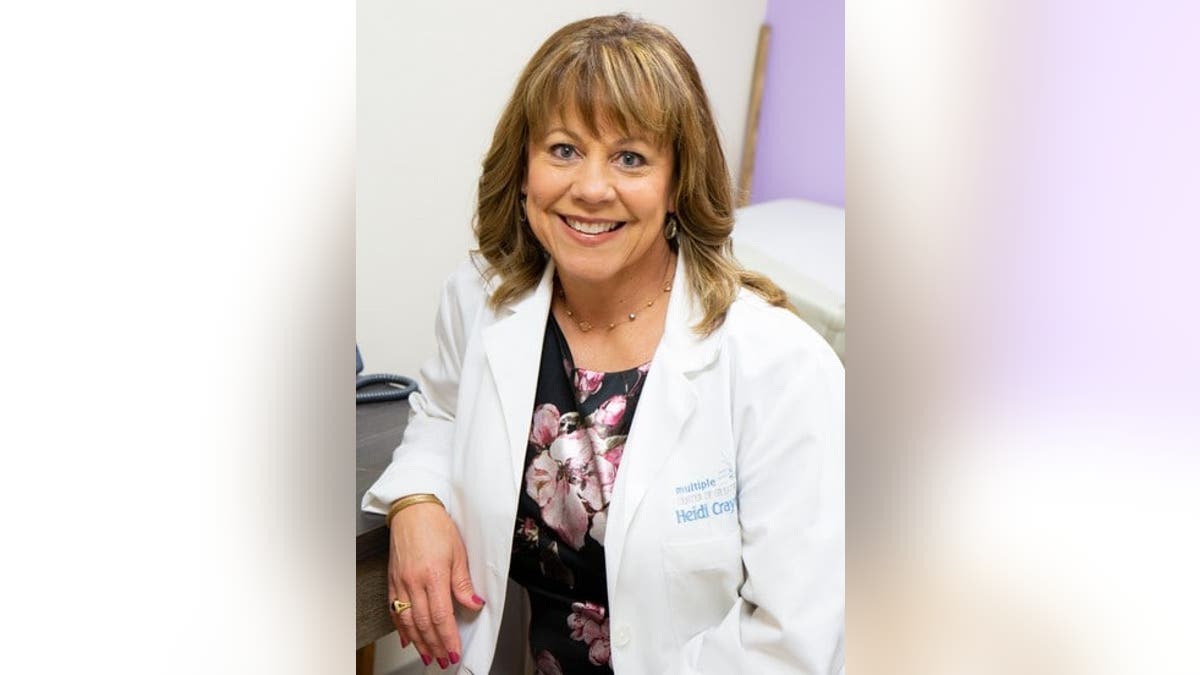Health
Errors in disease diagnosis lead to nearly 800,000 deaths, disabilities in US each year: study

Misdiagnoses in the U.S. lead to hundreds of thousands of deaths and major disabilities each year, according to a recent report from Johns Hopkins School of Medicine in Maryland.
Each year, an estimated 795,000 Americans become permanently disabled or die due to a misdiagnosis, the study found.
It was published in The BMJ, a peer-reviewed medical trade journal.
HEART ATTACK DEATH RISK CAN DOUBLE DURING HEAT WAVES AND HIGH POLLUTION, STUDY FINDS
The top five misdiagnosed conditions were stroke, sepsis, pneumonia, venous thromboembolism (formation of a blood clot in a vein) and lung cancer — which together made up 38.7% of all cases.
More than half of all serious harm cases were made up of only 15 dangerous diseases, which led researchers to believe the issue may be more manageable than expected.
The top five misdiagnosed conditions were stroke, sepsis, pneumonia, venous thromboembolism and lung cancer, which made up 38.7% of all cases, according to a new study. (iStock)
Study co-author Dr. David Newman-Toker, a neurology professor at the Johns Hopkins University School of Medicine and director of the Armstrong Institute Center for Diagnostic Excellence, told Fox News Digital in an interview how he and his team determined the number of affected people.
The “very simple” math, he said, included tallying up the total number of dangerous disease cases — such as heart attack, stroke, infections, vascular events and cancer — and multiplying that by both the error rate for each disease and the “risk of harm” associated with each error.

While these findings offer useful insights toward preventing misdiagnoses, Newman-Toker pointed out that this is the “most underfunded” sector of public health. (iStock)
The researchers used a “complex set of data sources” for each of these factors, according to Newman-Toker.
These included population-based data such as the National Inpatient Sample and national cancer registries, as well as systematic reviews.
AI HEART SCAN AIMS TO CATCH BLOCKAGES YEARS BEFORE SYMPTOMS: ‘UNBELIEVABLE BREAKTHROUGH’
“For the final totals, we used nine different methods to assess the impact of various assumptions we made along the way,” he said, “as well as to externally validate using other data sources and methods that our numbers were reasonable.”

Researchers from Johns Hopkins School of Medicine in Maryland found that misdiagnoses in the U.S. have led to hundreds of thousands of deaths and major disabilities each year. (iStock)
Regarding the total number of nearly 800,000 harmful outcomes, Newman-Toker said the results were “sort of unsurprising.”
He added, “We’ve known for quite some time that diagnostic errors are a significant hidden source of harm from medical error.”
And so, “to see a number that exceeded all the prior totals from medical error wasn’t that surprising to us.”
“The most important question to ask your doctor is: ‘What’s the worst thing this could be?’”
He added, “Most of those totals basically ignore diagnostic errors, and they’re sort of the bottom of the iceberg of patient safety and quality.”
What was surprising, Newman-Toker noted, was the relatively small number of diseases that accounted for a majority of errors.
ALZHEIMER’S DISEASE MAY BE DETECTED BY A FINGERPRINT BLOOD TEST FOR EARLIER DIAGNOSIS AND TREATMENT
“Fifteen diseases accounted for half of all the serious harms and just five diseases accounted for nearly 40%,” he said.
“That’s an important insight because it makes the problem more tractable, and the diagnostic errors are a problem across all sectors of medicine, with all diseases and in all contexts.”

To prevent misdiagnoses, patients should come prepared to doctor’s appointments by asking questions and remaining vigilant, said the lead researcher of a new study. (iStock)
“It’s easy for it to start to feel overwhelming from a problem-fixing standpoint,” Newman-Toker said.
“But this gives us an opportunity to actually tackle some of the highest harm problems and make a big dent in reducing the harms to patients.”
The researcher said he is hopeful that this kind of research could help curb major errors in the future.
“It tells us where the majority of harms are occurring.”
“It points us in the direction we need to go,” he said. “It tells us where the majority of harms are occurring.”
CLICK HERE TO SIGN UP FOR OUR HEALTH NEWSLETTER
While these findings offer useful insights toward preventing misdiagnoses, Newman-Toker pointed out that this is the “most underfunded” sector of public health.
For anyone concerned about a potential misdiagnosis, patients should come prepared to doctor’s appointments, ask plenty of questions and remain vigilant, said the researcher.

While these findings offer useful insights toward preventing misdiagnoses, Newman-Toker pointed out that this is the “most underfunded” sector of public health. (iStock)
Being prepared, according to Newman-Toker, means showing up with a “simple summary” of symptoms, as well as the patient’s medical history.
“The most important question to ask your doctor is, ‘What’s the worst thing this could be? And why is it not that?’” he said.
Rather than asking if they need a different medicine, patients should ask, “Are we sure the diagnosis was right?” said Newman-Moker.
“Those are the main things patients must do to protect themselves.”

Health
The Mediterranean Diet: A Plan for a Lifetime | Woman's World

Sign Up
Create a free account to access exclusive content, play games, solve puzzles, test your pop-culture knowledge and receive special offers.
Already have an account? Login
Forgot your password?
Get back to the Sign In
Use left and right arrow keys to navigate between menu items.
Use escape to exit the menu.
Health
First person with MS to play in the NBA shares his inspiring message: 'Make the most of it'

Multiple sclerosis is a life-changing diagnosis for one million people who are affected in the U.S. — but for a professional athlete, its physical limitations can seem particularly challenging.
Chris Wright, 34, the first person with MS to play in the National Basketball Association (NBA), has been living with the disorder since his 2012 diagnosis.
For World MS Day on May 30, Wright and his neurologist, Dr. Heidi Crayton, joined Fox News Digital in an on-camera interview from Washington, D.C., to discuss how he’s come to terms with his MS and to share words of wisdom for others facing the diagnosis. (See the video at the top of this article.)
DISRUPTED SLEEP, PLUS NIGHTMARES COULD BE LINKED TO AUTOIMMUNE DISEASES, EXPERTS SAY
Wright first experienced symptoms in 2012, he said, when he noticed tingling in his right foot while warming up for an overseas basketball game in Turkey.
“As I was shooting, I felt a tingling sensation in my right hand that eventually spread throughout my entire body within a matter of a minute,” he told Fox News Digital.
Chris Wright, 34, the first person with MS to play in the NBA, has been living with the disorder since his 2012 diagnosis. (Getty Images/Chris Wright)
His coaches sent him to a doctor, who told him to take the day off.
“The next morning I woke up, and I couldn’t walk. I couldn’t stand up. I couldn’t really use my limbs,” he recalled.
‘LIQUID GOLD’ COULD BRING NEW HOPE TO MULTIPLE SCLEROSIS PATIENTS, STUDY SUGGESTS: ‘PROFOUND BENEFIT’
Wright returned to the doctor, this time in a wheelchair.
“They sent me to a specialist, where I was quickly diagnosed with multiple sclerosis.”
MS is a chronic disease of the central nervous system that can affect movement, vision, speech and other functions.
After going through several other doctors, Wright found Dr. Crayton, a board-certified neurologist who practices at the Multiple Sclerosis Center of Greater Washington.

Chris Wright of Bertram Derthona Basket Tortona in action during the LBA Lega Basket Series A Playoffs Semi-Final Game 3 match between Bertram Derthona Basket Tortona and Virtus Segafredo Bologna PalaEnergica Paolo Ferraris on May 31, 2022, in Casale Monferrato, Italy. (Getty Images)
“What led me to her was her confidence and her ability to simplify what it meant to have MS and to make it manageable for me. [She] helped me understand that I could still go on with my career and my life in a way that I wanted to,” he said.
Crayton noted that the patient-doctor relationship is a “marathon, not a sprint.”
She told Fox News Digital, “It’s really important to find a doctor they can trust, who they can communicate with, who they can partner with to make decisions.”
TEENAGER IS PRIMARY CAREGIVER FOR NEW MEXICO MOM WITH MS: ‘WE’RE A TEAM’
“You need a team of people who support you, love you and accept you.”
Less than a year after his diagnosis, Wright became the first person with MS to play in the NBA when he signed with the Dallas Mavericks.
“MS impacted my career tremendously, because there was nobody before me,” Wright told Fox News Digital.
“You need a team of people who support you, love you and accept you.”
“I had NBA offers that were retracted because of the possibility of me having medical conditions and just being in uncharted territory — but I kept working and overcame it.”
BREAKTHROUGH FOR MULTIPLE SCLEROSIS SUFFERERS MAY INVOLVE HELPFUL HORMONE: ‘PATIENTS SHOULD REMAIN OPTIMISTIC’
Wright, a husband and father of three, is no longer playing basketball these days, but he is feeling healthy and enjoying life, he said.
“Living with MS, it looks good, it feels good — I feel great,” he said.
“I try to stay active. I try to stay healthy. I try to stay moving. And I’ve been able to keep myself healthy and continue to be a father and live my life the way I want to live.”
‘Badge of honor’
For all those facing a new diagnosis, Wright encouraged seeking out resources from people who have “walked these halls” before.
“There are people who understand what you’re going through, and it’s important to hear other stories and get a foundational knowledge of what your life will look like moving forward.”

After going through several other doctors, Wright found Dr. Crayton, pictured here, a board-certified neurologist who practices at the Multiple Sclerosis Center of Greater Washington. (Dr. Heidi Crayton)
Wright is involved with Express4MS, a campaign that encourages people with MS to express themselves, share their stories and discuss treatment options with their doctors.
“It’s just something you can put in your toolbox to find information, inspiration and motivation to live every day in a positive way,” Wright said.
“Walk with pride, and know that you’re going to be OK.”
“I would say to people: Stay with it, go through those tough times, figure out what works for you,” he said.
“Figure out how you can be successful at whatever it is you do.”
CLICK HERE TO SIGN UP FOR OUR HEALTH NEWSLETTER
Wright urges MS patients to look at the disease not as a hindrance, but as a “badge of honor.”
He said, “Walk with pride, and know that you’re going to be OK.”
Clayton advises her MS patients to “treat your body like a temple.”

Chris Wright of Bertram Derthona Basket Tortona in action during the LBA Lega Basket Serie A Playoffs Semi-Final Game 3 match between Bertram Derthona Basket Tortona and Virtus Segafredo Bologna PalaEnergica Paolo Ferraris on May 31, 2022, in Casale Monferrato, Italy. (Getty Images)
“It will pay you back in spades if you can invest in your health — eat well, exercise, sleep,” she said.
While people with MS will always have bad days, Wright is focused on maintaining a positive outlook.
“As long as you’re above ground, you have an opportunity to make the most of it,” he said.
“Every action has an equal and opposite reaction — so whatever you put out there is the energy that’s going to come back.”
For more Health articles, visit www.foxnews.com/health.
Health
Early stroke symptoms, plus allergy prevention and foods that promote sleep

EVERY SECOND COUNTS – Jenna Gibson was just 39 when a stroke nearly killed her. Here, she shares her story to help raise awareness among young women. Continue reading…
‘PUBLIC HEALTH CONCERN’ – ADHD now affects 1 in 9 kids in the U.S., a new report reveals. Mental health experts discuss reasons for the spike and how families can help. Continue reading…
EAT WELL, SLEEP WELL – Want a better night’s sleep? Researchers suggest eating more of these types of foods. Continue reading…
Consuming more fruits and veggies helps to support the right amount of sleep, a new study has found. (iStock)
SOMETHING FISHY? – A certain supplement has been linked to an increased risk of cardiovascular events for some people. Researchers and doctors weigh in. Continue reading…
HELP FOR VETS – The U.S. Department of Veterans Affairs is bringing mobile medical care to homeless vets. Patients share how the initiative is changing their lives for the better. Continue reading…
RISK REDUCTION – Feeding peanut butter to babies — starting during infancy and continuing until age 5 — has been shown effective in reducing allergies into adolescence. Continue reading…

Feeding peanut butter to babies has shown to be effective in reducing allergies into adolescence, according to a new study. (iStock)
‘HUGE STIGMA’ – For World Schizophrenia Day, a mental health expert debunks some of the most common myths surrounding the disorder. Continue reading…
ILL-EQUIPPED – Half of American adults don’t think they can help in a medical crisis, a new poll reveals. Continue reading…
EYE OPENER – Several nurses share what they wish they’d known before entering the profession. Continue reading…

Left to right, Karie Ryan, Michele Acito, Katelynn Blackburn and Lisbeth Votruba shared insights into the nursing profession with Fox News Digital. Two other nurses shared thoughts as well. (iStock/Karie Ryan/Michele Acito/Katelynn Blackburn/Lisbeth Votruba)
FOLLOW FOX NEWS ON SOCIAL MEDIA
YouTube
SIGN UP FOR OUR NEWSLETTERS
Fox News First
Fox News Opinion
Fox News Lifestyle
Fox News Health
Fox News Autos
Fox News Entertainment (FOX411)
DOWNLOAD OUR APPS
Fox News
Fox Business
Fox Weather
Fox Sports
Tubi
WATCH FOX NEWS ONLINE
Fox News Go
STREAM FOX NATION
Fox Nation
-

 Culture1 week ago
Culture1 week agoFrom Dairy Daddies to Trash Pandas: How branding creates fans for lower-league baseball teams
-

 News1 week ago
News1 week agoRed Lobster files for bankruptcy after missteps including all-you-can-eat shrimp
-

 News1 week ago
News1 week agoThe states where abortion is on the ballot in November : Consider This from NPR
-

 Politics1 week ago
Politics1 week agoMichael Cohen swore he had nothing derogatory on Trump, his ex-lawyer says – another lie – as testimony ends
-

 Politics1 week ago
Politics1 week agoAnti-Israel agitators interrupt Blinken Senate testimony, hauled out by Capitol police
-
News1 week ago
Trump's social media account shares a campaign video with a headline about a 'unified Reich'
-

 News1 week ago
News1 week agoRead Prosecutors’ Filing on Mar-a-Lago Evidence in Trump Documents Case
-

 Science1 week ago
Science1 week agoPregnant? Researchers want you to know something about fluoride

/cdn.vox-cdn.com/uploads/chorus_asset/file/23986616/acastro_STK097_02.jpg)










